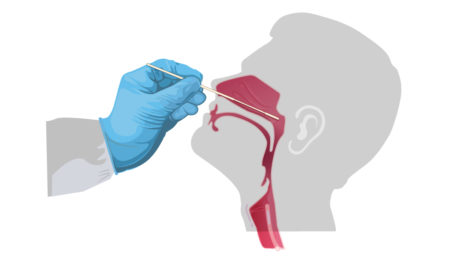Moldova gets risky, melatonin mania, sick French rabbits, and more
02 Feb 2022
Posted by Andrew Kantor
Asking the important question about Covid tests
“How Common Are Injuries From Covid-19 Nasal Swabs?” The Finns decided to find out, reviewing more than 600,000 tests over seven months to see how bad the crisis was.
The good news: There were only eight (8) “significant complications.”
The bad news:
Four of these were severe nosebleeds, some of which were life-threatening […] The other four were due to dislodged swab tips, necessitating urgent removal under local anesthesia.

When you hear it scraping your brain, it’s in deep enough.
New nasal flu vax
Nasal flu vaccines aren’t new, but how about one with … nanoparticles? If you’ve got mice you want to protect from the flu, biomedical researchers at Georgia State have good news for you: They’ve developed an influenza vaccine that uses nanoparticles to carry antigens where they can do their thing. (Nasal vaccines have some advantages over the shots in the arms.)
Apparently it works. At least, that’s what I assume this says:
“The PEI-HA/CpG nanoparticles show good potential as a cross-protective influenza vaccine candidate. The combination of PEI and CpG in the PEI-HA/CpG nanoparticle group contributed to the multifaceted immune responses, leading to vigorous cross protection. The incorporation of CpG and antigens into the same nanoparticle enhanced cellular immune responses.
Oh, wait, here’s a better one:
“Our results revealed that the nanoparticles significantly enhanced […] the ability to provoke an immune response, providing cross protection against different influenza virus strains.”
Rabbit tests
French researchers are rather pleased with themselves for finding Covid among the bunny rabbits, saying in the journal Veterinary Sciences, “We reported the first evidence of a natural SARS-CoV-2 infection in rabbits.”

The rabbits were less than pleased.
More about Mark Cuban’s pharmacy
Technically, it seems, it’s actually going to be a 503B compounding pharmacy — an outsourcing facility. That doesn’t mean less regulation (sorry, Endpoints News), just different regulation. That’s assuming Mark Cuban’s “Mark Cuban Cost Plus Drug Company” gets off the ground.
“At launch, we are planning as functioning primarily as a 503B compounding pharmacy specifically targeting drugs on the FDA shortage list. That will allow us to be more agile and address drug shortages as they arise.” —CEO Alex Oshmyansky
Right now, though, the only drug it’s listed with the FDA is generic albendazole.
What about the needle-phobic?
mRNA vaccines are the hot thing right now, but that’s bad news for the needle-phobic. To the rescue are MIT engineers, who have developed an oral mRNA vaccine.
The issue with oral RNA vaccines is that the digestive tract tends to destroy them before they can work. So the MIT folks have designed a capsule — yes, it uses nanotechnology (specifically, “a new type of polymeric nanoparticle”) that keeps the RNA safe long enough to work.
In a new study, Traverso and his colleagues showed that they could use the capsule they developed to deliver up to 150 micrograms of RNA — more than the amount used in mRNA Covid vaccines — in the stomach of pigs.
And if you’ve ever read Hannibal, you know that pigs’ stomachs tend to destroy anything.
Off the vacation list are…
Planning a holiday? The CDC’s updated you-really-shouldn’t-go list now includes [drumroll, please] … Mexico, plus Anguilla, Brazil, Chile, Ecuador, French Guiana, Kosovo, Moldova, Paraguay, Saint Vincent, the Grenadines, Singapore, and the Philippines. You know why.
Melatonin is hot stuff
If you think you’ve noticed more people taking melatonin supplements, you’re not alone … and you’re not imagining it.
“The use of over-the-counter melatonin supplements grew by fivefold over the past two decades in the United States” according to a study out of the Mayo Clinic. The guess is that it’s being used to help with sleep, but that wasn’t part of the data.
Interesting side notes: Melatonin comes in a lot more forms now (somewhat explaining the popularity), and it’s available in higher dosages (even though it has a flat dose-response curve).
You’re not fat, you have bad guts
Really, at this point we can just about blame gut bacteria for everything. Allergic to lettuce? Gut bacteria. Didn’t make the Super Bowl? Gut bacteria. Hate pineapple on pizza? Gut bacteria.
In this case, Emory researchers have found that there are particular bacteria — ones that produce delta-valerobetaine — that suppresses the liver’s capacity to oxidize fatty acids.
[P]eople who are obese or have liver disease tend to have higher levels of delta-valerobetaine in their blood. People with BMI > 30 had levels that were about 40 percent higher. Delta-valerobetaine decreases the liver’s ability to burn fat during fasting periods. Over time, the enhanced fat accumulation may contribute to obesity.
The next question: Is there a way to suppress that delta-valerobetaine so we can all lie back and eat Bon-Bons all day?


